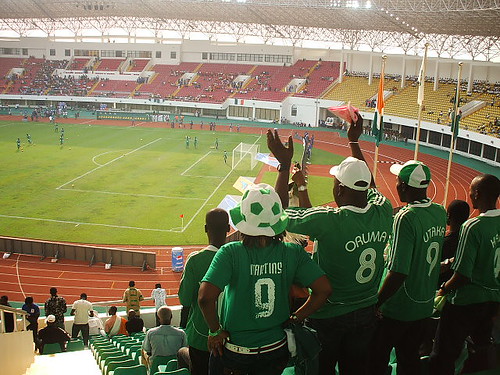
There is a popular soccer football phenomenon which says teams are more vulnerable to concede a goal right after scoring. On the surface it does not make sense…after all a team that has just scored now has the advantage and are raring to go for even more goals.
But if we take a cue from the Nigeria versus Argentina game last week, we will realize that this so called phenomenon might be true. In that game Lionel “From Jupiter” Messi scored a goal in the 3rd minute but then Ahmed “From Planet Earth” Musa with an unstoppable curling shot from the edge of the penalty box equalized. All this happened within 60 seconds!
Now, as if that was not enough Ahmed Musa then opened the second half with a well worked goal only for Argentina to come back again within 3 minutes to score an unstoppable glancing header kneed ball into the back of the Nigerian goal.
But it was not just the Nigeria/Argentina game that this phenomenon was observed. Our heavily paid researchers and experts at ofilispeaks.com (actually it was just me) went through all the 2014 world cup first round games and identified the number of matches in which a team conceded a goal less than 6 minutes after scoring one. Basically we wanted to see if this so called phenomena occurred in other games. And the result was interesting…
In the 48 games played in round 1 of the world cup, 9 of those games experienced that phenomenon where a goal was scored 6 minutes after another team had scored and in some cases more than one goal was scored. The games and number of goals involved in this phenomenon are as follows:
- June 23 Brazil versus Cameroon: 3 goals
- June 25 Nigeria versus Argentina: 4 goals
- June 20 Honduras versus Ecuador: 2 goals
- June 17 Russia versus South Korea: 2 goals
- June 21 Germany versus Ghana: 2 goals
- June 16 Ghana versus USA: 2 goals
- June 14 England versus Italy: 2 goals
- June 19 Colombia versus Ivory Coast: 2 goals
- June 18 Australia versus Holland: 4 goals
That is about 20% of the games played in round 1 experiencing this. Now this might not seem like a large number or anything significant. But when you consider the rarity of goals scored in soccer games and combine that with the fact that there are a total of as much as 90 minutes per game, you will realize that this is not just a flash in the pan phenomenon but actually something worth noting. Especially with 23 goals out of the record breaking 136 goals scored in the first round being impacted by this.
So why? Why is it that on over 17 different occasions during the first round of the 2014 world cup … a team that scored a goal conceded one within just 6 minutes? And most importantly what can your entrepreneurs learn from this? Here are my theories and the lessons…
#1 Theory: A Lack Of Concentration
In the aftermath of a goal the team that scored is excited. Players run out of position to celebrate and often times remain out of position till the referee ushers them in. But while they are celebrating, something interesting is happening on the other end. The other team is already on the pitch waiting for the game to re-start.
Yes they may be sad and disappointed but mostly the other team is ready, they are focused and likely already in formation. The focus of the other team juxtaposed to the distracting celebration from team that just scored is one of the factors (in my opinion) that increases the likelihood of the other team scoring.
And when the restart whistle is blown it is now 2 different teams facing each other, one distracted and out of position while the other one is organized and focused.
Just look at this clip of Gyan celebrating right after scoring against Germany.
https://vine.co/v/MTF9IY17bY6
Teammates including substitutes are dancing but what is interesting is what is taking place in the background. In the background, the German team can be seen walking into position. Now Germany did not score immediately after this or within 6 minutes…but 8 minutes later…well you know what happened.
#2 Theory: Energy Expended Celebrating
The amount of energy expended in celebrating a goal is huge. It sometimes involves the scorer running half way across the field into the arms of their coach or substitute bench, then comes the shouting and the occasional Sturridge break dance. All this requires energy. But this is nothing special, I mean this is soccer! Players are running around the field all the time. Or are they?
If you ever played soccer you realize that not everybody on the team is running (different from jogging) at the same time. In fact that rarely happens. What happens is that certain parts of the field move depending on where the ball is. But when a team scores…guess what…the entire team tends to run across the field to celebrate with the striker…even the keeper sometimes!
The fact that the entire team simultaneously expends energy running, screaming, dancing all in a bid to celebrate a goal, means that they have less energy than their opponents who are in most cases resting and waiting for the restart.
That energy difference is another factor that gives an advantage to the other team and before you know it…gbam! Another goal is scored!
#3 Theory: The Competition Is Desperate Effect
There is something about being behind in a game that makes you desperate to win. Maybe it is our prehistoric human survival instinct…
In the epic movie Okin Sea Biscuit about that horse ridden by Spider-man I mean Toby Maguire. The trainer taught Toby that the way to get Sea Biscuit to run the fastest was for him (Toby) to actually slow the horse down towards the end just enough that Sea Biscuit could see and feel the second place horse behind him. Weird right? But this had a profound impact on Sea Biscuit who ran even faster and harder once he felt that another horse was close to him.
I think that the Sea Biscuit effect takes place in soccer stadiums across the globe. A team that is suddenly on the losing side with nothing to lose becomes desperate and in that desperation actually pushes them to play harder and take more chances, which sometimes leads to a retaliatory goal!
Just take a look at the Italy versus Uruguay. For large chunks of the game the Italians down to 10 men were content to sit-back and soak in the Uruguay pressure. But immediately Uruguay scored, the Italian team desperate knowing that if they did not score they would go home, threw everything they could at the Uruguayans. Eventually they lost, but in those final minutes of desperation they seemed to be playing with a man advantage. Crazy things happens when we are desperate.
So What Does This Have To Do With Your Start-Up Business?
When some businesses especially small start-ups hit their first success milestones or their first major goal, they get excited.
So excited that they get caught up in the celebration of their goals. They make big announcements, throw elaborate parties funded by inflated evaluations and no real money, do big launches, grant several interviews, even go out and start giving seminars on how to run a successful business even though they have not yet reached any considerable level of success.
They spend so much time patting themselves on the back and partying, just like those lavish world cup goal celebrations. And while they are doing that, their competition is back in the office plotting and scheming on ways to get even or ahead. The competition is likely not expending resources celebrating, they are instead focused. And before you know it … just like the soccer phenomenon above … they have countered with a better product or a better idea or even the same idea just executed better.
In (/after) success, one makes the biggest errors.
– Ike Ofili
My older brother once said “Pounded Yam Will Make You Horny!” “In (/after) success, one makes the biggest errors.” And that is the truth. Because success can be distracting, can be confusing, can cause companies …especially small start-ups to lose concentration just long enough for the competition to catch up.
Don’t get distracted by the small awards or the small victories … always stay hungry and stay focused. Because while you are out there celebrating … your competition is focused on a plan to get back at you. Don’t ever forget that!
Photo Credit: nova3web via Compfight cc
This post was first published on Okechukwu’s blog under a different headline

















